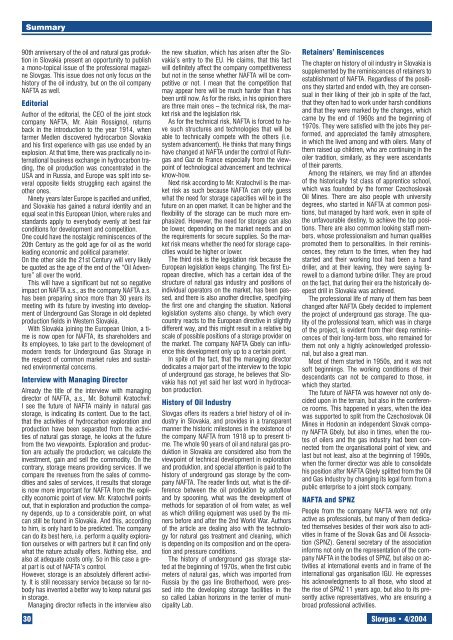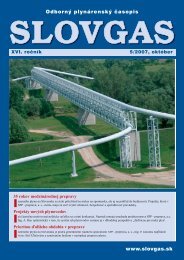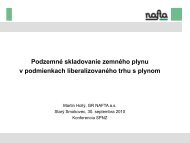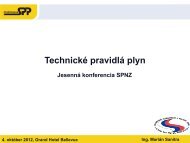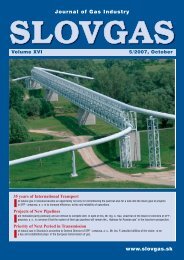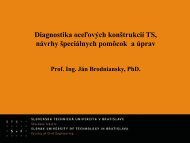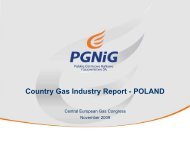Slovgas 4/2004 - Slovenský plynárenský a naftový zväz
Slovgas 4/2004 - Slovenský plynárenský a naftový zväz
Slovgas 4/2004 - Slovenský plynárenský a naftový zväz
Create successful ePaper yourself
Turn your PDF publications into a flip-book with our unique Google optimized e-Paper software.
Summary<br />
90th anniversary of the oil and natural gas produktion<br />
in Slovakia present an opportunity to publish<br />
a mono-topical issue of the professional magazine<br />
<strong>Slovgas</strong>. This issue does not only focus on the<br />
history of the oil industry, but on the oil company<br />
NAFTA as well.<br />
Editorial<br />
Author of the editorial, the CEO of the joint stock<br />
company NAFTA, Mr. Alain Rossignol, returns<br />
back in the introduction to the year 1914, when<br />
farmer Medlen discovered hydrocarbon Slovakia<br />
and his first experience with gas use ended by an<br />
explosion. At that time, there was practically no international<br />
business exchange in hydrocarbon trading,<br />
the oil production was concentrated in the<br />
USA and in Russia, and Europe was split into several<br />
opposite fields struggling each against the<br />
other ones.<br />
Ninety years later Europe is pacified and unified,<br />
and Slovakia has gained a natural identity and an<br />
equal seat in this European Union, where rules and<br />
standards apply to everybody evenly at best fair<br />
conditions for development and competition.<br />
One could have the nostalgic reminiscences of the<br />
20th Century as the gold age for oil as the world<br />
leading economic and political parameter.<br />
On the other side the 21st Century will very likely<br />
be quoted as the age of the end of the “Oil Adventure”<br />
all over the world.<br />
This will have a significant but not so negative<br />
impact on NAFTA a.s., as the company NAFTA a.s.<br />
has been preparing since more than 30 years its<br />
meeting with its future by investing into development<br />
of Underground Gas Storage in old depleted<br />
production fields in Western Slovakia.<br />
With Slovakia joining the European Union, a time<br />
is now open for NAFTA, its shareholders and<br />
its employees, to take part to the development of<br />
modern trends for Underground Gas Storage in<br />
the respect of common market rules and sustained<br />
environmental concerns.<br />
Interview with Managing Director<br />
Already the title of the interview with managing<br />
director of NAFTA, a.s., Mr. Bohumil Kratochvíl:<br />
I see the future of NAFTA mainly in natural gas<br />
storage, is indicating its content. Due to the fact,<br />
that the activities of hydrocarbon exploration and<br />
production have been separated from the activities<br />
of natural gas storage, he looks at the future<br />
from the two viewpoints. Exploration and production<br />
are actually the production; we calculate the<br />
investment, gain and sell the commodity. On the<br />
contrary, storage means providing services. If we<br />
compare the revenues from the sales of commodities<br />
and sales of services, it results that storage<br />
is now more important for NAFTA from the explicitly<br />
economic point of view. Mr. Kratochvil points<br />
out, that in exploration and production the company<br />
depends, up to a considerable point, on what<br />
can still be found in Slovakia. And this, according<br />
to him, is only hard to be predicted. The company<br />
can do its best here, i.e. perform a quality exploration<br />
ourselves or with partners but it can find only<br />
what the nature actually offers. Nothing else, and<br />
also at adequate costs only. So in this case a great<br />
part is out of NAFTA’s control.<br />
However, storage is an absolutely different activity.<br />
It is still necessary service because so far nobody<br />
has invented a better way to keep natural gas<br />
in storage.<br />
Managing director reflects in the interview also<br />
the new situation, which has arisen after the Slovakia’s<br />
entry to the EU. He claims, that this fact<br />
will definitely affect the company competitiveness<br />
but not in the sense whether NAFTA will be competitive<br />
or not. I mean that the competition that<br />
may appear here will be much harder than it has<br />
been until now. As for the risks, in his opinion there<br />
are three main ones – the technical risk, the market<br />
risk and the legislation risk.<br />
As for the technical risk, NAFTA is forced to have<br />
such structures and technologies that will be<br />
able to technically compete with the others (i.e.<br />
system advancement). He thinks that many things<br />
have changed at NAFTA under the control of Ruhrgas<br />
and Gaz de France especially from the viewpoint<br />
of technological advancement and technical<br />
know-how.<br />
Next risk according to Mr. Kratochvil is the market<br />
risk as such because NAFTA can only guess<br />
what the need for storage capacities will be in the<br />
future on an open market. It can be higher and the<br />
flexibility of the storage can be much more emphasized.<br />
However, the need for storage can also<br />
be lower, depending on the market needs and on<br />
the requirements for secure supplies. So the market<br />
risk means whether the need for storage capacities<br />
would be higher or lower.<br />
The third risk is the legislation risk because the<br />
European legislation keeps changing. The first European<br />
directive, which has a certain idea of the<br />
structure of natural gas industry and positions of<br />
individual operators on the market, has been passed,<br />
and there is also another directive, specifying<br />
the first one and changing the situation. National<br />
legislation systems also change, by which every<br />
country reacts to the European directive in slightly<br />
different way, and this might result in a relative big<br />
scale of possible positions of a storage provider on<br />
the market. The company NAFTA Gbely can influence<br />
this development only up to a certain point.<br />
In spite of the fact, that the managing director<br />
dedicates a major part of the interview to the topic<br />
of underground gas storage, he believes that Slovakia<br />
has not yet said her last word in hydrocarbon<br />
production.<br />
History of Oil Industry<br />
<strong>Slovgas</strong> offers its readers a brief history of oil industry<br />
in Slovakia, and provides in a transparent<br />
manner the historic milestones in the existence of<br />
the company NAFTA from 1918 up to present time.<br />
The whole 90 years of oil and natural gas produktion<br />
in Slovakia are considered also from the<br />
viewpoint of technical development in exploration<br />
and produktion, and special attention is paid to the<br />
history of underground gas storage by the company<br />
NAFTA. The reader finds out, what is the difference<br />
between the oil produktion by autoflow<br />
and by spooning, what was the development of<br />
methods for separation of oil from water, as well<br />
as which drilling equipment was used by the miners<br />
before and after the 2nd World War. Authors<br />
of the article are dealing also with the technology<br />
for natural gas treatment and cleaning, which<br />
is depending on its composition and on the operation<br />
and pressure conditions.<br />
The history of underground gas storage started<br />
at the beginning of 1970s, when the first cubic<br />
meters of natural gas, which was imported from<br />
Russia by the gas line Brotherhood, were pressed<br />
into the developing storage facilities in the<br />
so called Labian horizons in the terrier of municipality<br />
Lab.<br />
Retainers’ Reminiscences<br />
The chapter on history of oil industry in Slovakia is<br />
supplemented by the reminiscences of retainers to<br />
establishment of NAFTA. Regardless of the positions<br />
they started and ended with, they are consensual<br />
in their liking of their job in spite of the fact,<br />
that they often had to work under harsh conditions<br />
and that they were marked by the changes, which<br />
came by the end of 1960s and the beginning of<br />
1970s. They were satisfied with the jobs they performed,<br />
and appreciated the family atmosphere,<br />
in which the lived among and with oilers. Many of<br />
them raised up children, who are continuing in the<br />
oiler tradition, similarly, as they were ascendants<br />
of their parents.<br />
Among the retainers, we may find an attendee<br />
of the historically 1st class of apprentice school,<br />
which was founded by the former Czechoslovak<br />
Oil Mines. There are also people with university<br />
degrees, who started in NAFTA at common positions,<br />
but managed by hard work, even in spite of<br />
the unfavourable destiny, to achieve the top positions.<br />
There are also common looking staff members,<br />
whose professionalism and human qualities<br />
promoted them to personalities. In their reminiscences,<br />
they return to the times, when they had<br />
started and their working tool had been a hand<br />
driller, and at their leaving, they were saying farewell<br />
to a diamond turbine driller. They are proud<br />
on the fact, that during their era the historically deepest<br />
drill in Slovakia was achieved.<br />
The professional life of many of them has been<br />
changed after NAFTA Gbely decided to implement<br />
the project of underground gas storage. The quality<br />
of the professional team, which was in charge<br />
of the project, is evident from their deep reminiscences<br />
of their long-term boss, who remained for<br />
them not only a highly acknowledged professional,<br />
but also a great man.<br />
Most of them started in 1950s, and it was not<br />
soft beginnings. The working conditions of their<br />
descendants can not be compared to those, in<br />
which they started.<br />
The future of NAFTA was however not only decided<br />
upon in the terrain, but also in the conference<br />
rooms. This happened in years, when the idea<br />
was supported to split from the Czechoslovak Oil<br />
Mines in Hodonin an independent Slovak company<br />
NAFTA Gbely, but also in times, when the routes<br />
of oilers and the gas industry had been connected<br />
from the organisational point of view, and<br />
last but not least, also at the beginning of 1990s,<br />
when the former director was able to consolidate<br />
his position after NAFTA Gbely splitted from the Oil<br />
and Gas Industry by changing its legal form from a<br />
public enterprise to a joint stock company.<br />
NAFTA and SPNZ<br />
People from the company NAFTA were not only<br />
active as professionals, but many of them dedicated<br />
themselves besides of their work also to activities<br />
in frame of the Slovak Gas and Oil Association<br />
(SPNZ). General secretary of the association<br />
informs not only on the representation of the company<br />
NAFTA in the bodies of SPNZ, but also on activities<br />
at international events and in frame of the<br />
international gas organisation IGU. He expresses<br />
his acknowledgments to all those, who stood at<br />
the rise of SPNZ 11 years ago, but also to its presently<br />
active representatives, who are ensuring a<br />
broad professional activities.<br />
30 <strong>Slovgas</strong> • 4/<strong>2004</strong>


